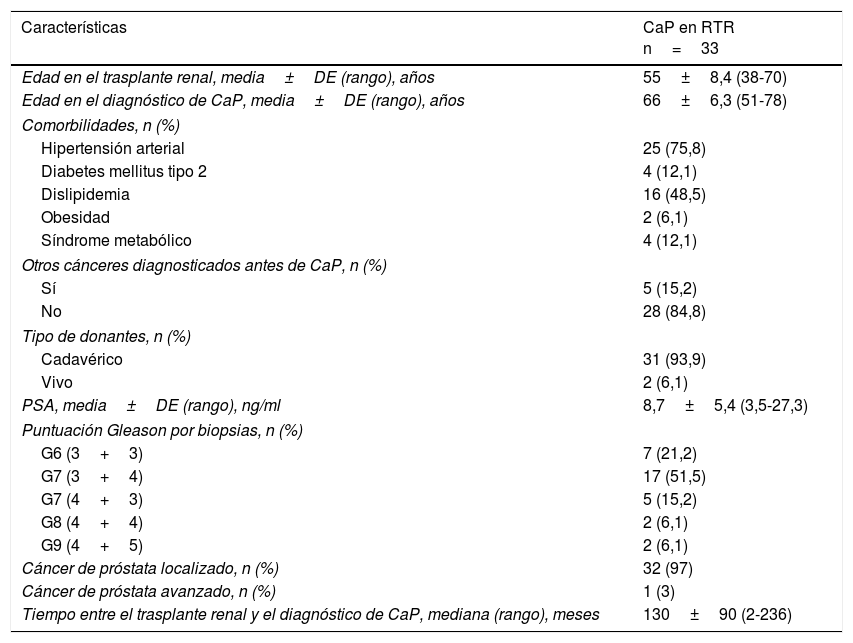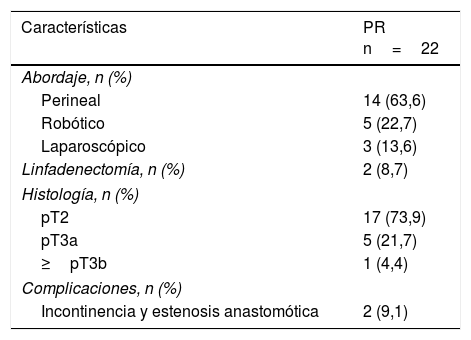El manejo del cáncer de próstata (CP) en receptores de trasplante renal (RTR) es un reto y muchos aspectos siguen siendo controvertidos. Actualmente no hay consensos sobre el manejo de esta enfermedad. El objetivo del estudio fue analizar nuestra experiencia en el diagnóstico y tratamiento del CP en RTR.
MétodoEstudio monocéntrico retrospectivo de una base de datos prospectiva y consecutiva del 2003-2017. Inclusión de RTR diagnosticados de CP. Estadificación y tratamiento según guías contemporáneas. Los principales parámetros evaluados incluyeron estadificación clínica, tipo de tratamiento, resultados oncológicos y seguimiento.
ResultadosDe 1.330 trasplantes renales (787 varones), se diagnosticó CP en 33 RTR (4,2%), con una edad media de 66años±6,3 (51-78). La media de PSA fue de 8,8ng/ml y PSA ratio de 0,19. El tiempo medio entre el trasplante renal y el diagnóstico de CP fue de 130 meses±90 (2-236). Tratamiento: prostatectomía radical (PR) (n=22; 66,7%), radioterapia (RT) más terapia de privación androgénica (TDA) (n=7; 21,2%), vigilancia activa (n=3; 9,1%) y TDA (n=1; 3%). No se reportaron pérdidas del injerto ni deterioro de la función renal atribuibles al tratamiento del CP. Tras PR, 2 pacientes (9,1%) presentaron recurrencia bioquímica, tratados con RT. La remisión fue del 100% y el seguimiento medio, de 61 meses±37 (6-132).
ConclusionesEl CP en trasplantados renales puede ser manejado con las mismas opciones terapéuticas que en la población general. La vigilancia activa debería también considerarse en los RTR a pesar de estar bajo tratamiento inmunosupresor.
The management of Prostate cancer (PCa) in renal transplant recipients (RTR) is challenging and remain controversial. Currently there is no consensus about this condition. The aim of the study was to analyse our experience in the diagnosis and management of PCa in RTR.
MethodRetrospective monocentric study of a prospective and consecutive database from 2003-2017. Inclusion of RTR diagnosed of PCa. Staging and treatment in agreement with the contemporary guidelines. The main outcome measures included clinical staging, type of treatment, oncological outcomes and follow-up.
Results1,330 renal transplants were performed (787 males), diagnosed of PCa in 33 RTR (4.2%), mean age 66years±6.3 (51-78). Median PSA was 8.8ng/ml and PSA ratio 0.19. Mean time between renal transplantation and PCa diagnosis 130months±90 (2-236). Treatments: Radical prostatectomy (RP) (n=22; 66.7%), Radiation therapy (RT) with Androgen deprivation therapy (ADT) (n=7; 21.2%), Active surveillance (n=3; 9.1%), ADT (n=1; 3%). No graft loss neither impaired renal function due to PCa treatment was reported. After RP two patients (9.1%) presented biochemical recurrence treated with RT. Remission of the 100%. Mean follow-up was 61months±37 (6-132).
ConclusionsPCa in renal transplant patients can be managed with the same therapeutic options as in the general population. Active surveillance should also be provided in RTR despite being under immunosuppressive therapy.
Artículo
Comprando el artículo el PDF del mismo podrá ser descargado
Precio 19,34 €
Comprar ahora












